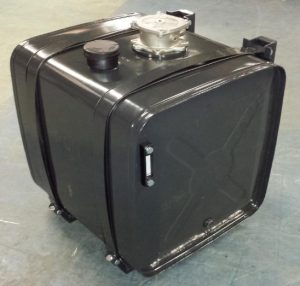Call us on +44 (0)1327 842808 |
Published on 22 March 2022
Hydraulic systems are used in a wide range of industrial settings for a variety of applications. From industrial buildings and construction equipment to vehicles, hydraulic systems are an efficient and affordable way to create repetitive movements. The transport industry, commercial vehicles, and plants are the sectors that commonly utilise hydraulic systems.
Also known as a reservoir, hydraulic tanks are essential for storing hydraulic fluid. Without the hydraulic oil reservoir, the system will not be supplied with fluid which will affect the system’s performance and may lead to long-term issues with the equipment. If the system is turned off, the oil will drain from the hydraulic oil reservoir and return to the tank. This means that to avoid potential issues you must ensure the capacity for oil in the system is sufficient.
The fluid in the hydraulic oil reservoir is important for a variety of functions. It acts as a power transmission device, lubricant, sealant, and a way of transferring heat. For the oil to operate efficiently and assist your operations, you need to store it in the right hydraulic oil reservoir. While the usage of hydraulic systems changes, they all function using the same concept: they perform operational functions through a pressurised fluid.
Hydraulic systems are used in heavy equipment because of the power of the liquid fuel. Pressure applied to a confined fluid at any point in a hydraulic system is transferred with the same power. The pressurised fluid exerts force or power on every area of the contained vessel’s section. Operators can lift huge objects and complete precise repetitive tasks with ease because of the usage of this force, which is controllable depending on how it’s applied.
You should also condition the hydraulic fluid to settle contaminants and improve the fluid quality. During downtime, the oil sits resting in the hydraulic oil reservoir which is when contaminants settle at the bottom of the tank and form a sludge. You must regularly remove the sludge from the tank to prevent it from building up, blocking the suction line, and causing potential short- and long-term issues. To prevent air from collecting inside the system, you should clean the breather cap monthly and replace it once per year.
Amongst the wide range of functions hydraulic tanks perform is the dissipation of heat through the walls of the system to cool the fluid stored in the hydraulic oil reservoir. The larger the tank, the greater the capacity is for cooling the fluid. When choosing the right hydraulic system for your operations, the size of the tank is an essential factor to consider.

When choosing the ideal hydraulic tank for your organisation you must consider the size of the system. The volume of the tanks should be three times the rated output of the hydraulic system pump, as a rule of thumb. Utilising this method ensures you have a sufficient volume of hydraulic fluid to rest between containment settling cycles, dissipation, and deaeration. However, even when using this calculation, you should still take into account the duty cycle and ambient air temperature.
Whatever your industry or intended application, you should ensure the hydraulic tank matches your specifications. Understanding your system’s requirements and specifications is essential to choosing a system that supports your operations. To remove any guesswork when buying an oil tank for a hydraulic system, get in touch with the experts.
At PCM Handling, our team specialise in delivering services and equipment to OEM companies and fleet operators, as well as a wide range of industrial businesses across the UK. As part of our services, we offer a dedicated customer trade counter that gives you complete access to our full range of products. Choose PCM Handling to supply your hydraulic oil reservoir today.
PCM Handling has been supplying speciality equipment to the transport sector in the UK for over 30 years. Our team’s experienced understanding guarantees you always obtain the proper solution for your needs, from hydraulic oil tanks to commercial vehicle hydraulic equipment to crane attachments.
We can examine your needs and point you in the direction of the best hydraulic system for your company. Call us now on +44 (0)1327 842808 or fill out an inquiry form on our contact page and we’ll be in touch shortly.
Fill in the form below and a member of the team will be in touch with you shortly.
© 2025 PCM Transport and Handling
Web Design and Marketing by Loop Digital